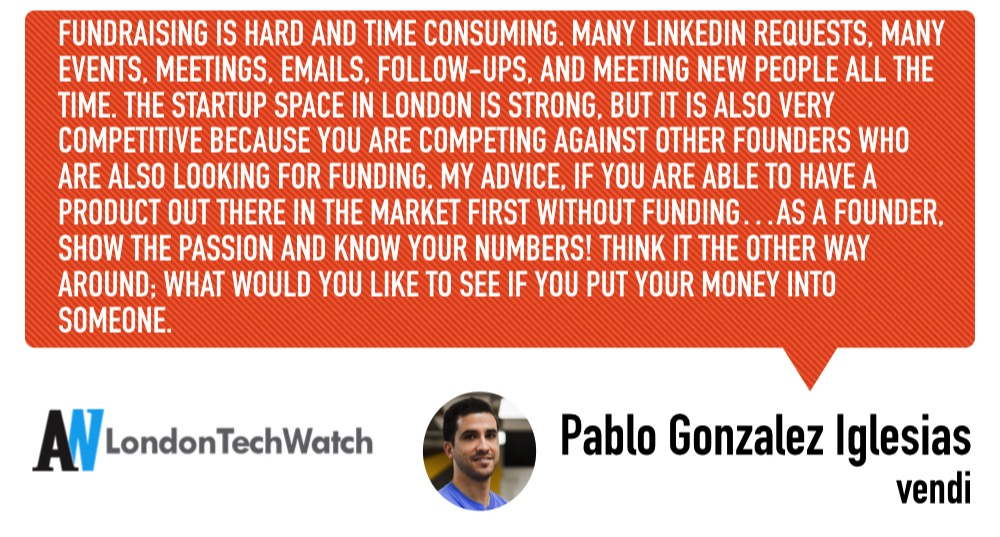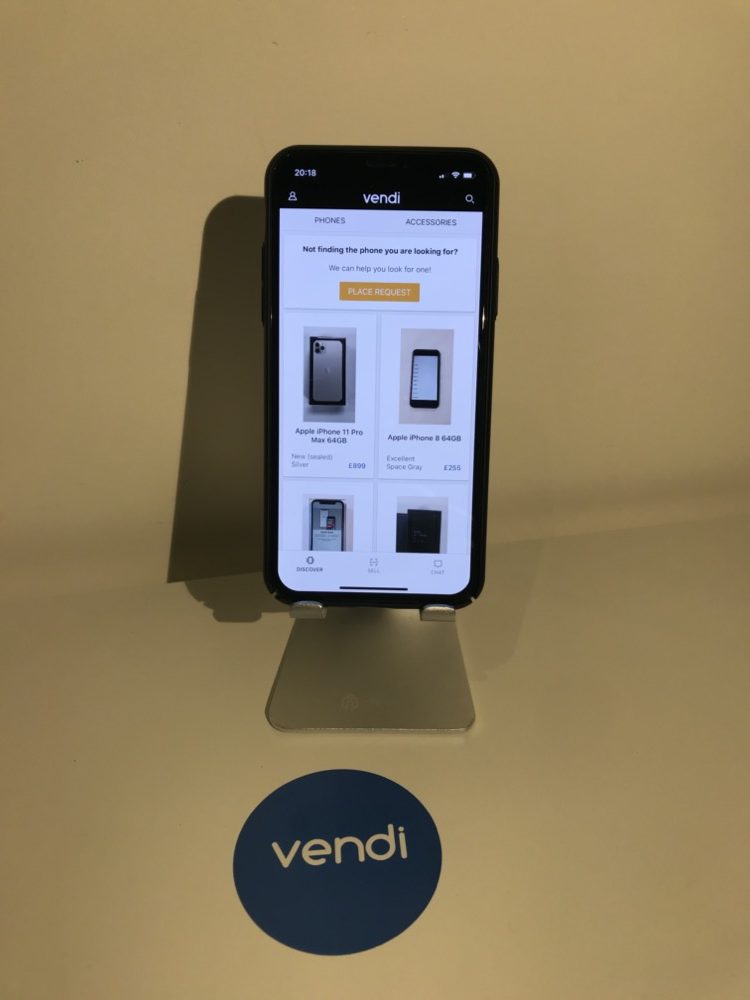If you say the phrase “peer-to-peer” marketplace the usual players come to mind – Facebook, eBay, and Gumtree. However, scams, or fraudulent buyers and sellers, are a major problem threatening the value and safety of the P2P community. vendi has created its own P2P marketplace to ensure the safety of its community and the authenticity of products and transactions. vendi is the only P2P marketplace that verifies the buyer, seller, and the actual product. vendi, presently focused on only listings of mobile phones on its platform, with plans to expand to other products.
London Techwatch sat down with Cofounder and CEO Pablo Gonzalez-Iglesias to learn more about vendi’s recent funding, the decision to focus on smartphones initially, and future expansion plans.
London TechWatch: Who were your investors and how much did you raise?
Pablo Gonzalez-Iglesias, Vendi: This is vendi’s first round, it is the pre-seed round: investors include Sustainable Ventures from London, serial entrepreneur and investor Jorge Gonzalez-Iglesias (exited founder), and Angels from UK, Spain, and the US.
Tell us about the product or service vendi offers.
vendi is a peer-to-peer marketplace to buy and sell verified products, starting with phones. The biggest problems marketplaces face are data structure and scams, the two main added values vendi offers. As a buyer, pay in-app and your money is blocked until the phone is verified by a network of repair shops. As a seller, take 2 pictures and your phone is listed, powered by AI tech, on the app. Once sold, the seller drops off or send the phone to a specialist to check that the phone works as described. After this interaction, the buyer receives the phone and the seller is paid. vendi brings an augmented peer-to-peer experience very much needed in the market. With this security, you can find phones 30-60% cheaper (new and pre-owned) than retail.
 What inspired the start of vendi?
What inspired the start of vendi?
In 2018, I was scammed for my mobile phone when I encountered a thief and fraudster, instead of an honest buyer, whilst trying to sell a phone on a supposedly reputable marketplace. In the attack which ensued, I not only lost my phone, but I nearly lost my ear! This incident, as well as other fraud attempts in multiple marketplaces, led my cofounder and I to think deeply about what was wrong with the P2P marketplaces; consumers can find great prices for new and preowned products, however with each transaction, there is an underlying risk of becoming a victim of fraud.
How is vendi different?
vendi is the only P2P marketplace where the buyer, seller, and product are fully verified. Furthermore, vendi is developing machine learning algorithms to help sellers list and price their items: take a few pictures and vendi describes the item for you. On vendi you can get the product picked up from your home, removing any hassles sellers experience.
What market is vendi targeting and how big is it?
vendi’s initial focus is in the UK secondhand phone market. Electronics are the products that are bought and sold the most online, and phones are becoming more expensive each year, making users look into pre-owned phones (Technavio 2017). Furthermore, 2.5 billion people have a smartphone and the market is dominated by only a few brands (iPhone, Samsung, and Huawei account for almost half of the world’s market share) (Statista 2017, Thenational 2017).
According to Deloitte, in 2016 the used smartphone market was of $17B. The secondhand market is on the rise, with the global market for refurbished smartphones growing 13% y/y in 2017, but only 25% of all pre-owned phones are sold back into the market. There is a very big opportunity to improve the current marketplace paradigm and give access to users who do not want to care about the hassles of selling a phone in a traditional risky peer-to-peer marketplace.
Who do you consider to be your primary competitors?
The pre-owned products marketplaces industry, from a higher level, is competitive. Gumtree, Facebook, eBay, and Shpock are the main players. Our biggest advantage is that we tackle the main problem all these marketplaces face. In the future, we want to collaborate with them, not consider them a competitor.
What’s your business model?
Listing on vendi is free. Once sold, a seller pays a 3% + £10 fee. The buyer, to have the phone verified and cover the payment gateway costs, pays another 3% + £10. Buyers can also add a 30-day money-back guarantee for £5 and add insurance to their device, giving vendi an extra revenue stream.
What was the funding process like?
Fundraising is hard and time-consuming. Many Linkedin requests, many events, meetings, emails, follow-ups, and meeting new people all the time. The startup space in London is strong, but it is also very competitive because you are competing against other founders who are also looking for funding. My advice, if you are able to have a product out there in the market first without funding, target investors that share your industry expertise and values. As a founder, show the passion and know your numbers! Think it the other way around; what would you like to see if you put your money into someone.
What are the biggest challenges that you faced while raising capital?
It is somewhat of a chicken and egg situation in the early stages. Investors ask for a certain growth, but sometimes to achieve that growth, funding is required.
In the UK investors are keener to invest in B2B solutions as the risk levels are lower than in other countries, so this also makes it even more challenging when your product is initially C2C focused.
What factors about your business led your investors to write the check?
The problem we are solving is huge: fraud in peer-to-peer marketplaces. There are different ways to solve it, whoever finds the best way will become very powerful. In P2P marketplaces, we believe we have built the way to stop any type of fraud and that is something that has generated interest.
Furthermore, looking at other countries like the US that are starting to invest in these solutions it is generating interest to the investment landscape in Europe. We also have a sustainability angle as we are making re-using devices between users safer and more accessible. This also is something investors have liked.
Furthermore, looking at other countries like the US that are starting to invest in these solutions it is generating interest to the investment landscape in Europe. We also have a sustainability angle as we are making re-using devices between users safer and more accessible. This also is something investors have liked.
Also, the team: Anil and myself both have worked together in Cisco for 3 years and built an internal startup there – this gave investors’ confidence about the founding team, key in early stages.
What are the milestones you plan to achieve in the next six months?
We will add more products into the app (Tablets, smartwatches, etc), open at least 20 more verification points around the UK, and close a deal with one of the largest repair phone brands in the UK.
What advice can you offer companies in London that do not have a fresh injection of capital in the bank?
Be as lean as possible (with or without money to be honest). We spent our first year and a half with no external funding, built the marketplace, launched it, and went to generate revenues. There are also many free sources out there to help you build and test your product to get early signs of traction without the need for a lot of capital. Do not spend your money on non-essential things, like an expensive office, at the start. Google Startups is a great place to start free.
Where do you see the company going now over the near term?
Now we are scaling the app to support more users, planning to introduce at least 3 more categories, and looking to collaborate with a larger marketplace that can leverage our verification tech and network. We will continue to expand around the UK and look for more users!
What is your favorite restaurant in London?
Inpescheria, fantastic Italian food and fresh fish!
You are seconds away from signing up for the hottest list in LondonTech! Join the millions and keep up with the stories shaping entrepreneurship. Sign up today






